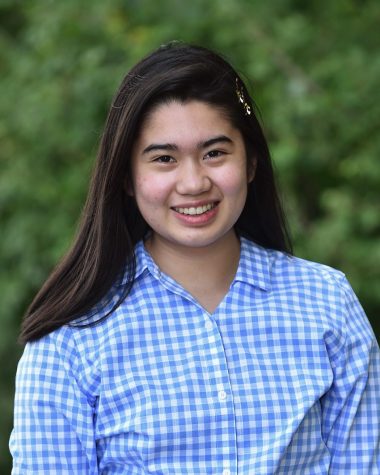Upper School Play: My Big Greek Tragedy
May 3, 2019
60’s dance music for a Greek tragedy? An Oedipus who raps?
On Friday, May 3, at 7 pm, and on Saturday, May 4, at 4 pm, Upper School actors will perform My Big Greek Tragedy in the Wyckoff Family Black Box. This play will capture its viewers’ attention through its comedic adaptations of widely loved classic Greek tales – The Odyssey, Oedipus the King, Oedipus at Colonus, and Antigone.
Mr. Griffa and Ms. Doran, along with students Ellie Haljun ‘19, Katie Libman ‘19, Michael Crispi ‘19, and Brode Menzies ‘20, are directing the production, written by playwrights Rosalind Flynn and Stacey Coates. The inclusion of student directors gives a group of talented and motivated upperclassmen the opportunity to have leadership experience in an arena that they love.
“[Ms. Doran’s and my] first instinct was to find something written by female playwrights. I also have been wanting to introduce Greek tragedy to the St. Luke’s community, so I think this is the best way to introduce it. To many people, they think that wrapping their head around Greek tragedy is more than their mind can take because Greek tragedy is sad, and there is always death. This play deconstructs the complexity of the Greek tales,” says Mr. Griffa.
The play starts with an adaptation of Homer’s epic poem The Odyssey. The fictitious tale follows a victorious hero, Odysseus, played by Henry Jodka ‘20, on a long journey home from the Trojan War. To get back, Odysseus battles mythical creatures, and throughout this journey, Greek gods manipulate him, extending his time at sea. Little does he know that when he arrives home, he will not only be reunited with his beloved wife, Penelope, and his only son, Telemachus, but will also find suitors who plan to marry his wife.
Next, the play will transition to the stories of Oedipus: Oedipus the King, Oedipus at Colonus, and Antigone. This part of the play starts with two royals, King Laius and Queen Jocasta of Thebes, who seek an oracle to determine the fate of their baby boy, Oedipus. Once they find out their son’s gruesome fate, that he will marry his mother and kill his father, they plan for a shepherd to kill Oedipus in the woods. They have no clue that their son survives, and the action begins when Oedipus accidentally fulfills his horrible prophecy.
This play is a true ensemble piece. Aside from Henry Jodka playing Odysseus, actors will perform more than one character, and one character will be played by more than one actor. There is not only one Oedipus, for example.
“What we decided to do instead of keeping the same character [is to] spread it around. So the audience does not get confused, we try to differentiate the characters, and actors also introduce whom they are playing and the Greek Chorus adds to that as well. Thus, the fourth wall is broken,” adds Mr. Griffa.
The play does not fail to incorporate the traditional components of Greek tragedies, such as a Greek chorus. Greek choruses play an integral role in the productions of Greek tragedies, as they comment upon the main action of the play and act as background singers. Still, the production has sections that echo current popular culture. The play includes 60’s music, raps, and dances to make the performance accessible to the audience.
“I am really excited about this production; it seems really fun, and I am sure that the audience will love it,” says Liana Seale ‘21, an actress in the play.
Head to the Black Box on Friday and Saturday to see your friends acting on stage. You might even see your friend who plays Oedipus pull his eyes out!



